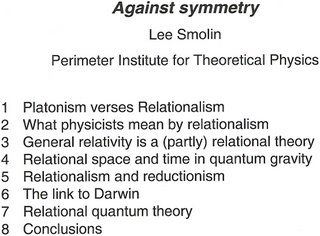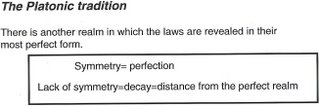I am not sure what I can add other then what I have already been saying toward logical deduction....I still need to get a handle on the essence of what is being said here in opening thread.
So with what I looked at, can we say that the deductive recognition of lets say symmetry would be in contrast to how you might look at the world in a relativistic sense versus Platonism.
See: Against Symmetry
This setting was used more I think in terms of how a scientist is explaining himself and his relationship with the way in which he had approached science.....yet I could see there were scientist who had adopted the Platonic Tradition. Example of Penrose and Coxeter were demonstrative of this idea?
5.4.3 Platonism and Relativism
Platonism is a family of views that get their name because they involve entities--propositions, properties, sets--which, like Plato's Forms, are held to be abstract, immutable things that exist outside space and time. On many platonistic approaches, concepts express abstract properties and beliefs are relations between people and abstract propositions. This suggests a way around some types of relativism, since people in quite different cultures could have many of the same beliefs (because they could believe the same abstract propositions), and a belief would be true just in case the immutable proposition it expresses is true.
The relativist may reply that platonistic accounts lead to severe difficulties in epistemology and semantics. The problem is that we are physical organisms living in a spatio-temporal world, and we cannot interact causally (or in any other discernible way) with abstract, causally inert things. Moreover, few people are aware of having any special cognitive faculty that puts them in touch with a timeless realm of abstract objects, neuroscientists have never found any part of the brain that subserves such an ability, such a view is not suggested by what is known about the ways children acquire concepts and beliefs, and nothing in physics suggests any way in which a physical system (the brain) can make any sort of contact with causally inert, non-physical objects. Moreover, if our minds cannot make epistemic contact with such things, it is difficult to see how our words and linguistic practices can make semantic contact with them.
None of this proves that abstract propositions don't exist, but it shows it isn't obvious that they do. There have been few debates between relativists and platonists over such matters, however, perhaps because the two views lie so far apart that their proponents cannot easily engage one another.
So these were two positions that were adopted within the push toward understanding the basis of science and it's mathematics.
In theory model development was pushed forward on the basis of such adoptions. Loop Quantum Gravity?
Quasicrystal: Prof. Dan Shechtman
***
Just throwing some stuff together in order to understand the extent of relativism as a universal truth, while seeking to understand the subjective realism that make up our individuality. As a layman I do not know if it will be useful under that admittance. You can judge for yourself of course.
Most people think of "seeing" and "observing" directly with their senses. But for physicists, these words refer to much more indirect measurements involving a train of theoretical logic by which we can interpret what is "seen."- Lisa Randall
If one was to solidify some basis to truth how would this be done? The question of a logic oriented view for me saw a basis in what Penrose was explaining using his Twistors, as a foundation in incorporating Fuzzy logic?
While examining the psychological model of Venn logic and TA combined, it was important that there be some relative framework for such a subjective interpretation of a logic orientated world. How subjectively could this have been managed?
Perspective of the Theoretical Scientist
So you have this history and theoretical perspective that sees the world in one way or another? How do you reduce it to a process through Computing that establishes a basis in machining the effects of [and\or-so that we say a statement is .7 true and .3 false.]? We've created a space in between a true and false statement?
DNA computing is a form of computing which uses DNA, biochemistry and molecular biology, instead of the traditional silicon-based computer technologies. DNA computing, or, more generally, molecular computing, is a fast developing interdisciplinary area. Research and development in this area concerns theory, experiments and applications of DNA computing See:DNA computing
Entanglement then provides for other understanding then of a framework that sees the interrogation of a subjective world?
Do we selectively ignore other models from artificial intelligence such as Zadeh's Fuzzy Logic? This is a logic used to model perception and used in newly designed "smart" cameras. Where standard logic must give a true or false value to every proposition, fuzzy logic assigns a certainty value between zero and one to each of the propositions, so that we say a statement is .7 true and .3 false. Is this theory selectively ignored to support our theories? Ideas on Quantum Interrogation
***
Geometry Leads us to the Truth?
Part of the realism here for me is the idea that such patterns established deep within our psyche are inherent in each of us as an image first to our awareness, but encompasses a geometric patten of sorts. This was part of the work I did on myself as I explored the realm of dreams. The idea then manifested in what was the basis of this thought process as mandala in origins. A historical vision of an ancient idea of model building. In today's world I thought this as appropriate toward how theoretical ideas are built around a whole history of science and information.



Philosopher-scientist,
ReplyDeleteYou may want to check out my blog today where I mention you and Lubos in connection to this post and his and the general theme on mine.
Also on google circle Bon Iver has some videos up if you are interested.
The PeSla pesla.blogspot com
Hi ThePeSla,
ReplyDeleteYes I went to have a look at Intuition and Error Correction Codes
ThePeSla:yet I disagree that Coxeter or Penrose was Platonic either in the higher sense
In the sense that I would have reduced the process to some universal process as to ignite DNA computing as a question of the subjective experience I can see what you are saying as being outside now.
Just to quote Coxeter,
Dialogos of Eide: Donald Coxeter
Jun 10, 2011
Donald Coxeter. Photo by Graham Challifour. Reproduced from Critchlow, 1979, p. 132. "I'm a Platonist — a follower of Plato — who believes that one didn't invent these sorts of things, that one discovers them. In a sense, all ...
Dialogos of Eide: Donald Coxeter: The Man Who Saved Geometry
Sep 11, 2006
I am very glad that I can move from the Salvador Dali image of the crucifixtion, to know, that minds engaged in the "pursuites of ideas" as they may "descend from heaven," may see in a man like Donald Coxeter, the way and ...
Dialogos of Eide: Coxeter and Plato's Cave
Sep 12, 2006
Was it so distant from the real world that such "projective geometries" exposed the correlation of knowledge from a man like Coxeter, that you would say "I would rather demomnstrate the technological aspect because this is ...
Dialogos of Eide: Numerical Relativity and the Human Experience?
Mar 31, 2008
Donald (H. S. M.) Coxeter. I contrast the nature of Numerical Relativity to the computer and the way we would think human consciousness could have been linked in it's various ways. Who hasn't thought that the ingenuity of ...
These are some under the label of Coxeter.
Penrose, you might same.
I enclose the opening of the blog entry with two links with regard to quasi structure for showing what was found.
I am still struggling with the term relativism myself as I have sen it used in today's science and by giving examples hope to solidify some understanding on my part. It seems philosophically the subject is quite large.
Best,
"...underwriting the form languages of ever more domains of mathematics is a set of deep patterns which not only offer access to a kind of ideality that Plato claimed to see the universe as created with in the Timaeus; more than this, the realm of Platonic forms is itself subsumed in this new set of design elements-- and their most general instances are not the regular solids, but crystallographic reflection groups. You know, those things the non-professionals call . . . kaleidoscopes! * (In the next exciting episode, we'll see how Derrida claims mathematics is the key to freeing us from 'logocentrism'-- then ask him why, then, he jettisoned the deepest structures of mathematical patterning just to make his name...)
ReplyDelete* H. S. M. Coxeter, Regular Polytopes (New York: Dover, 1973) is the great classic text by a great creative force in this beautiful area of geometry (A polytope is an n-dimensional analog of a polygon or polyhedron. Chapter V of this book is entitled 'The Kaleidoscope'....)"
Kaleidoscope
ReplyDeleteHello Plato,
ReplyDeleteI just saw your reply as I am learning better how the internet works... impressive thoughts- thank you. I am not opposed to post modern ideas although I think we should go beyond that era.
I am posting some metaphors or new ways to see old ideas as problems in geometry, some not adequately explained (to me anyway) so for now I will call this area E-physics, not sure where it may lead, E for perhaps Eide or as in your school of athens banner ek... but I am not sure how you use the word if it fits.
I took up the major issues as if to look again at Plato so tried to write along those lines, philosophy with odds and ends- hope it is readible and if nothing else you enjoy it- in the blogworld there can be high level and serious dialog.
I think somehow your diagram on Laplace my have influenced my thoughts on inverting the cobe sphere.
Of course it is a mistake to see the world as relative because of the drama of the discovery of non-Euclidean geometry- in all of these we have to resolve them as much as we have to resolve the physics. It could be the same problem and the heart of a particle may show more who is leaning to a Platonic ideal. The LHC rediscovers Plato?
So who says philosophy is not still important for science as we go back to the source and origins perhaps to find a new direction? But would that be but a discovery?
:-) no reply from no reply is necessary
The PeSla
Hi The PeSla,
ReplyDeleteI answered you at your blog post.
Best,